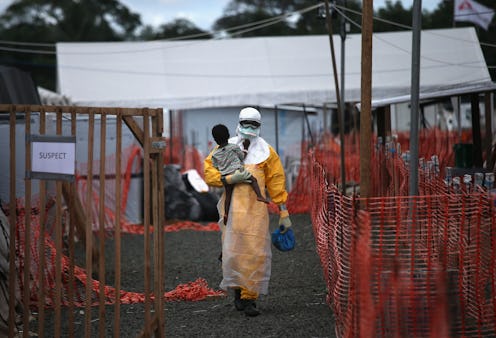News
Ebola Funding Would Help in More Ways Than One
Effective health care is a beautiful thing. It's the huge reason why there's been some actual good Ebola news to report lately, at least as far as the United States is concerned — Texas is now officially Ebola-free, for example, and New York City Ebola victim Craig Spencer has improved enough to strum a banjo. But at its epicenter in West Africa, the Ebola outbreak is still proving to be a durable and highly-lethal tragedy, which is why President Obama requested $6.2 billion in Ebola funding from Congress Wednesday. And, as detailed in a in-depth report from NBC News' Maggie Fox, that money would go further than just halting the virus' spread — it'd also be used to build an improved health infrastructure, to protect West Africa from future health crises like this.
It's no secret that the state of health care in the three nations mainly hit by the Ebola outbreak, Guinea, Sierra Leone and Liberia, are nowhere near as well-financed or well-equipped to combat the spread of a virus like Ebola as the United States is. As Vox's Julia Belluz previously reported, more than half of the $6.2 billion figure is slated to be spent on the West African Ebola response, but it could also prove to be a major boon for health care in West Africa writ large.
Fox's report cites some striking figures from the World Bank that demonstrate the extent of the health care problems resident of these West African states face. Beyond even the equipment and money to provide quality care, the poor ratio of doctors to patients makes it massively harder just to receive medical attention at all — Guinea is estimated as having ten doctors for every 100,000 people, while Sierra Leone and Liberia have just one out of 100,000.
Of course, there are myriad other reasons Ebola has proven to be such a scourge. There's also a considerable amount of misinformation and distrust that exists in West Africa, and convinced people exhibiting symptoms of Ebola to hunker down rather than seek care.
But if it's possible to direct some money to make health care a little easier or more accessible at the same time as the tide of the outbreak is stemmed, that's an opportunity that can't be overlooked. The $6.2 billion figure does represent a significant sum — Obama initially only requested 88 million — but considering the federal deficit is at its lowest levels of Obama's presidency, and has been cut to pre-recession levels, it does seem like an ideal time to be proactive with some vitally-needed foreign aid.
Images: Getty Images
